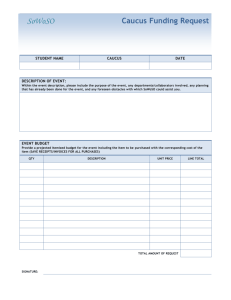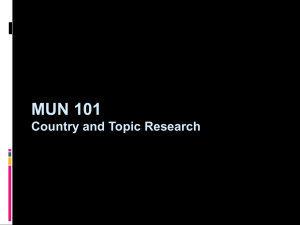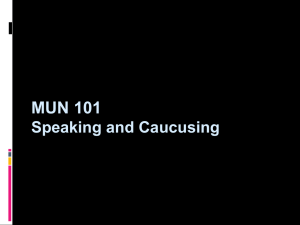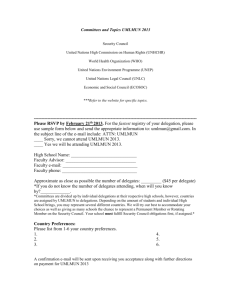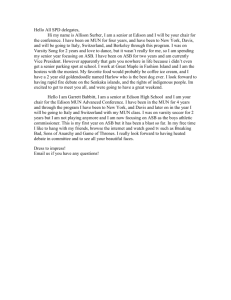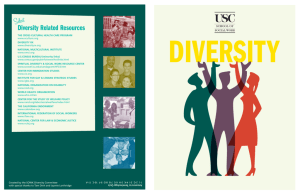Advanced Training Packet LHHS MUN 2013-2014
advertisement
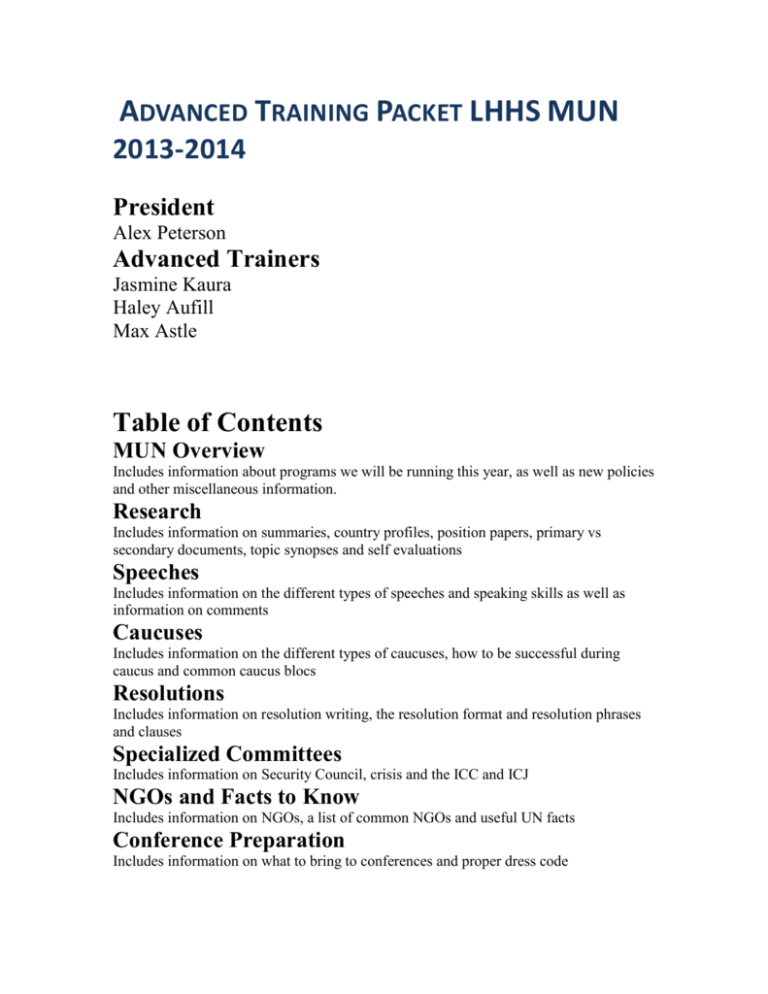
ADVANCED TRAINING PACKET LHHS MUN 2013-2014 President Alex Peterson Advanced Trainers Jasmine Kaura Haley Aufill Max Astle Table of Contents MUN Overview Includes information about programs we will be running this year, as well as new policies and other miscellaneous information. Research Includes information on summaries, country profiles, position papers, primary vs secondary documents, topic synopses and self evaluations Speeches Includes information on the different types of speeches and speaking skills as well as information on comments Caucuses Includes information on the different types of caucuses, how to be successful during caucus and common caucus blocs Resolutions Includes information on resolution writing, the resolution format and resolution phrases and clauses Specialized Committees Includes information on Security Council, crisis and the ICC and ICJ NGOs and Facts to Know Includes information on NGOs, a list of common NGOs and useful UN facts Conference Preparation Includes information on what to bring to conferences and proper dress code MUN Overview LHHS MUN Point System Overview: This year we will be continuing the MUN Point System that we integrated last year. We have decided to change the program to better fit the goals of the advisors and trainers, and all changes are listed below as well as an overview of the system as a whole for those of you who still aren’t exactly sure what it’s all about. What is the MUN Point System? The MUN Point System is a program designed to track the progress of all of our delegates in a simple and controlled way. Each delegate will now receive points based solely on their performance within the program. For those of you who were a part of MUN last year, this means that participation in roasts and daily attendance at conferences will no longer factor in to the amount of points you receive. Points will be distributed based off of awards, chairing, and a few other things as well. Point Distribution Delegates receive points for the following: Research Award – 1 Point o Research Award points ARE CAPPED at 2 points per year i.e. if you win 3 research awards you will still only receive 2 points in the point system Commendation – 1 Point Outstanding – 2 Points Best Delegate/Gavel – 3 Points Attending 4 conferences – 1 Point In addition, all awards earned at college conferences will be worth an additional point, so a Commendation will be worth 2 points, and Outstanding will be worth 3 points etc. In addition, delegates can be penalized for the following: Dress Code Advisor Complaints Cell Phone Use during committee These will all result in 1 point being subtracted from the delegate’s total, and yes, you can get negative points. Required number of points: Sophomores – 4 Points Juniors and Seniors in Brown’s – 5 Points Juniors and Seniors in Mrs. Geiger’s – 6 Points If You Don’t Get All of Your Points: If you don’t get your required number of points, your MUN teacher will decide on what action will be taken. It’s Not Actually That Bad: Although at first glance, the point system may seem difficult, it really isn’t. If you were to go to SM’s conference and win an Outstanding, go to Mission and win a Commendation, get a research at UCI, and go to 4 conferences, you would receive enough points to qualify in every single class. What Does the Point System Do for Me? First off, getting enough points for your class guarantees you a spot in MUN next year. These point values are also considered during secretariat interviews. There may also be extra bonuses for delegates who earn more than the minimum number of points they are required to get. It will also allow the advisors and trainers to view your progress and see how you are progressing in the program and what we can do to help you do better. _____________________________________________________________ Advanced Training Day 1: Introduction, Research, Caucuses, Resolutions We will discuss research techniques and skills for summaries and position papers, how to write a topic synopsis and the differences between primary and secondary sources, as well as defining the difference between the three types of caucuses, and how to write and present a resolution. Days: 2 and 3 Speeches We will discuss speaking skills and techniques, cover impromptu and prepared speeches and go over comments and questions. This year, we will be trying something different as well. For these two days, we will be running the training sessions as a mock committee where all points of committee procedures can be practiced. We think this will help everyone prepare for SM, as well s provide a needed review of all of the important MUN procedures. Day 4: Conference Prep, NGOs, and Specialized Committees For the final day of advanced training, we will be going over how to prepare for your next upcoming conference, the multiple different NGOs that you will hear throughout your MUN experiences, and the different Specialized Committees that you will see throughout MUN. Advanced Training Homework Day 1 Assignment: On the first day of advanced training, you will be assigned a country and a topic to research before the mock committee on the 2nd and 3rd days of training. You will be asked to write one speech and a one-page position paper on the topic. The speech can be bulleted or you can choose to make an impromptu speech, but if you do make an impromptu speech know you will still be graded for performance and will not be given any advantage over a traditional speech. Day 2 and Day 3 Assignments: NONE Day 4 Assignment: BASED ON PERFORMANCE TODAY – If everyone is paying attention and seems to understand resolution format and procedure, there will be no homework. However, if there is something that the advanced trainers think needs to be addressed, then we will assign homework accordingly. _______________________________________________________________________________ Research I. Summaries A. Always follow the proper summary format outlined below. B. Always complete your summaries before your position papers. C. Attach your highlighted articles to your summaries (1 article for each summary) D. Number each highlighted article according to the summary it coincides with. E. One article MUST be a primary source: UN resolution, press release, etc. F. You may write in bullet form (6 bullets) or paragraph form (10 sentences) G. Do NOT copy articles. You may use a quotation if it’s cited with quote marks. II. Summary Format Every delegate must write summaries for each conference. If you are in a one-topic committee, you must write five summaries. For committees with any more than one topic, do ten summaries, writing an equal number of summaries for each topic. For a three-topic committee, do three summaries for two of your topics and four summaries for the third topic. For each committee topic, make sure you write at least one summary on background, one on UN Involvement and one on solutions. Example Summary Format Name: John Doe Committee: Security Council Conference: Santa Margarita MUN Israel/Palestine Summaries 1) Title: Israel Profile Address: http://www.bbc.co.uk/news/world-middle-east-14628835 Date: May 8th 2012 Background • Six bullet points here Notes: Whether you write six bullets as in the example above or ten sentences in paragraph form, you only should include the most important points from each article in each summary. Also, in the heading in the top left, you DON’T need to write the words Name, Committee, and Conference. However, you DO need to write the words Title, Address and Date in each summary heading. The date is the date the article was written or last updated, not the date you wrote the summary. In the summary heading, below the word Date, you must state which part of your position paper the summary is referring to: Background, UN Involvement or Country Policy and Solutions . III. Country Profiles Unless you are in a specialized committee or are otherwise directed not to do so, you must write a country profile for each conference. This profile is a worksheet containing background information on your specific country. The profile must be hand written in either pencil or black or blue ink and may be written directly on the country profile worksheet. This worksheet can be found on the Laguna Hills High School MUN website (http://www.lhhsmun.org). A very useful website for country profile is The World Fact Book ( https://www.cia.gov/library/publications/the-world-factbook/). IV. Position Papers A. First read your chair’s topic synopses for information on your topics. B. Make sure you address EVERY question listed in the synopses. C. Other areas to think about a) The economic and political impact of my government on my people. b) How my nation interacts with neighboring countries and the UN. c) My nation’s religions and how they play a role in my nation. d) Important events in my nation’s history and how they’ve impacted it. e) The money and resources my nation possesses f) Major conflicts, disasters, terrorist attacks and wars in my nation g) My nation’s military and nuclear capabilities h) Does my nation give or receive aid? Who to or from? Why? i) My nation’s allies and enemies j) Which caucus groups my nation is involved with V. LHHS Position Paper Format LHHS Position Papers MUST be TYPED and follow the format below. Each conference and almost all specialized committees have their own format. Always check the conference website to see your committee’s position paper format for each conference. If you are still confused by a format, ask an advanced trainer, the President or your committee’s chair for help. Always make sure to cite your sources, whether the particular position paper format asks you to or not. LHHS Format: PART 1: COUNTRY PROFILE a. Refer above for information on the country profile PART 2: BACKGROUND OF TOPIC a. Historical background of the topic b. Who and which nations are directly involved? c. Why is this a problem for the world? PART 3: UNITED NATIONS INVOLVEMENT a. How did the UN get involved b. Committees, agencies, and NGOs of the UN that are involved c. UN action: resolutions passed, committees and organizations set-up, etc... PART 4: COUNTRY POLICY AND SOLUTIONS a. Your nation’s position and involvement in the issue b. The actions your nation has taken in the past to solve the problem c. Possible solutions that your nation plans to propose VI. Primary vs Secondary Documents A. Primary Sources 1. Graphs and statistics (Good For Speeches and Handouts) a. NGOs, UN Agencies, UN Committees 2. Individual Embassies i) Search for UN nation embassies on google a. Type in UN-USA or UN-UK or UN-Italy, etc... 3. UN Website- http://www.un.org/search/ i) Search for documents such as: a. Specific resolutions and treaties 4. Press Releases B. Secondary sources 1. Encyclopedias, Wikipedia, News Stories, Publications VII. Mock Topic Synopsis Below is a very brief topic synopsis. Although incomplete, it is what many synopses will look like. At the bottom, there will typically be a list of questions to answer. Background: India and Pakistan’s continuing dispute over the Kashmir region is as old as the countries themselves. Both countries were formed in 1947, when British India was partitioned into two separate countries. In the face of a Muslim revolt, the Hindu maharajah of the mostly Islamic Kashmir placed his state under Indian control. Indian troops fought Pakistan- backed rebels in Kashmir until a 1949 UN cease-fire divided it into regions of Indian and Pakistani control. Pakistan and many of Kashmir’s Muslim inhabitants never accepted the division and the tensions between these countries erupted into war in 1966 and 1971. UN Involvement: The United Nations have been constantly involved in this issue throughout its history; they have continuously been the mediator and source of peace between these two feuding nations. To stop the endless fight for control over Kashmir, the UN has created a resolution that called for both parties to adhere to the Line of Control, a mutually agreed cease-fire line. Numerous other resolutions have also been passed. Bloc Positions: India: Opposes Pakistani rule. Feels that Pakistani government promotes terrorism. Western Bloc (Including Africa, South America): Condemns all terrorism wherever. Violence will not solve Kashmir’s problems. Pakistan should also do its utmost to discourage any acts of violence by militants in Kashmir. Pakistan: The dispute must be settled peacefully in accordance with the wishes of the Kashmiri people. Feels that Indian occupation forces are harming the Kashmiri people. Asia: China is an ally of Pakistan and it is no secret that it is also its main arms supplier. Although a supporter of Pakistan in the recent years, it has adopted a neutral position. Sources http://www.kashmirtimes.com/ http://www.ummah.org.uk/kashmir/ VIII. Self Evaluation Format Delegates need to fill out a self evaluation after each conference. Here is the format: Name: Conference: Committee: Country: Topics: Respond to all five of the following questions. You may write your responses in the form of a log or journal; the style may be informal. Each response should be approximately one to two paragraphs in length. Attention must be paid to detail. The self evaluation is due on different days for each teacher. After they tell you, it is your job to remember. 1. What was your first impression of your committee and did this perception change throughout the course of the conference? Why or why not? 2. Comment on the general nature of the committee: caucusing, speeches, comments, resolutions, and resolution writing, etc. Note anything unusual about the committee which you have not witnessed at prior conferences. 3. Explain your process of researching for this conference and any research procedures that you have not used in the past. Comment on the effectiveness of your methods. 4. What seemed to be the characteristics of the delegates who took control during committee and/or were recognized with awards? If you received an award, describe anything you did that may have differed from what you did at previous conferences. 5. What impressed you about your committee and the conference in general that we could use at our Twelfth Annual Conference? What were some deficiencies you saw in committee or at the conference that should be avoided at our conference? My co-delegate was ______________________________________. Speeches I. Impromptu Speeches A. Impromptu speeches are not prepared, rather they’re done on the spot. B. Each speech should be unique and add new information. C. Steps For an Impromptu Speech: 1) Use all of the techniques in the speaking skills section above. 2) Decide quickly what your overall message will be. 3) Do NOT try to memorize any part of your speech. a) You will often mess up and then become lost 4) Confidence is key! 5) If you accidentally go on a tangent, get back to your main point quickly. D. To practice impromptu speaking, talk about a person, place or thing for as long as possible without repeating yourself. If you can talk for two minutes, that is great! 1) Example topics are Disneyland, Bill Gates, BMW, a country, television, a sport, an athlete, a sports team, computers, flowers, and school 2) For a challenge, try talking for two minutes about a color, the sky, trees, a stapler, a pencil, a baseball or a basketball. II. Prepared Speeches A. You may either write a full speech or write bullets 1) This is personal preference. Do what you’re more comfortable with. B. Know your information and be confident while delivering it. C. If an idea is confusing in your head, it will be a disaster when you say it out loud III. General vs. Substantive Debate A. General Debate: Delegates give their nation’s policy & background on the topic. B. Substantive Debate: Delegates give possible solutions and proposals C. Commenting typically takes place only during Substantive Debate. 1) While commenting, say more than just “I agree with your point”. Caucuses I. Three Types of Caucusing A. Unmoderated Caucus: The type of caucus where delegates leave their seats to share their ideas freely and form resolution groups. 1) Don’t give away your best ideas until you have said them in a speech 2) Take charge of your caucus group: a) Gather a group of people and be the first to speak. b) DON’T start off by saying “What does everyone think?” i) Start off by giving a great idea and letting others add on. c) Create the backbone of many ideas and let others fill in details. d) Be loud but not annoying; be careful not to cross this line. e) Get everyone involved and actually listen to what they say. ii) Add what they say into your main idea iii) Get the delegates who just sit there into your group. They may not do anything, but they give you more say. 3) Always write as many operatives of your resolution as possible, however, NEVER sacrifice quality for quantity. a) Organize your resolution and have the other delegates send you their operatives. B. Moderated Caucus: The type of caucus where the chair calls on delegates one at a time to speak. This will exhaust the speaker’s list or will be separate from the speaker’s list to discuss a specific aspect of the topic at hand. 1) Always try to speak in a moderated caucus - they’re easy points! 2) If you are prepared to speak, raise your placard right away. 3) If you aren’t ready to speak: a) This is an impromptu speech - follow the steps above. b) Do not write out a speech for a moderated caucus. i) Quickly write 3-5 bullet points. ii) When giving your speech, elaborate on each point. C. Formal Caucus: This is when groups present resolutions. 1) Always try to present your resolution. 2) This shows you are a leader and other delegates will look up to you. II. Caucus Blocs Note: A bloc is a group of nations that have common interests or who are located in close geographic proximity. Common interests may be economic, defensive, ethnic, or one of many other things. Oil-producing countries are an example of an economic bloc. A single country may be at a disadvantage when pitted against a larger country, but a bloc of nations will have much more power in decision making. African Bloc Angola, Benin, Botswana, Burkina Faso, Burundi, Cameroon, Central African Republic, Chad, Comoros, Congo, Cote d`Ivoire, Dem. Rep. of the Congo, Djibouti, Equatorial Guinea, Eritrea, Ethiopia, Gabon, Gambia, Ghana, Guinea, Liberia, Madagascar, Malawi, Mali, Mauritania, Mauritius, Mozambique, Namibia, Niger, Nigeria, Rwanda, Sao Tome & Principe, Senegal, Seychelles, Somalia, Sudan, Swaziland, Tanzania, Togo, Uganda, Zambia, and Zimbabwe Asian Bloc Afghanistan, Australia, Bangladesh, Bhutan, Brunei, Micronesia, Singapore, Cambodia, China, Fiji, India, Indonesia, Japan, Laos, Malaysia, Maldives, Marshall Islands, Mongolia, Myanmar, Nepal, New Zealand, North Korea, Pakistan, Palau, Papua New Guinea, Philippines, Samoa, Solomon Islands, South Korea, Sri Lanka, Thailand, Vanuatu, and Vietnam Eastern Bloc Albania, Armenia, Azerbaijan, Belarus, Bosnia Herzegovina, Bulgaria, Croatia, Czech Republic, Estonia, Georgia, Hungary, Kazakhstan, Kyrgyzstan, Latvia, Lithuania, Macedonia, Moldova, Poland, Romania, Russian Federation, Slovak Republic, Slovenia, Tajikstan, Turkmenistan, Ukraine, Uzbekistan, and Yugoslavia Latin Bloc Antigua/Barbuda, Argentina, Bahamas, Barbados, Belize, Bolivia, Brazil, Chile, Colombia, Costa Rica, Cuba, Dominica, Dominican Republic, Ecuador, El Salvador, Grenada, Guatemala, Guyana, Haiti, Honduras, Jamaica, Mexico, Nicaragua, Panama, Paraguay, Peru, St. Vincent & Grenadines, St. Kitts & Nevis, St. Lucia, Suriname, Trinidad & Tobago, Uruguay, and Venezuela Middle East Bloc Algeria, Bahrain, Egypt, Iran, Iraq, Jordan, Kuwait, Lebanon, Libya, Morocco, Oman, Palestine, Qatar, Saudi Arabia, Syria, Tunisia, United Arab Emirates, and Yemen Western Bloc Andorra, Austria, Belgium, Canada, Cyprus, Denmark, Finland, France, Germany, Greece, Holy See, Iceland, Ireland, Israel, Italy, Liechtenstein, Luxembourg, Switzerland, Malta, Monaco, Netherlands, Norway, Portugal, San Marino, South Africa, Spain, Sweden, Turkey, USA and UK Resolutions I. Resolution Writing A. Have a clear objective; don’t change your main goal halfway through B. Refer to the format below and the preamble clauses on the next page C. Preambles act as the history of the topic and an introduction D. Operative clauses provide your group’s solutions (The need to be realistic) E. If your ideas are similar with another resolution, consider merging groups. Preamble Clauses Preamble Clauses Affirming Alarmed by Approving Aware of Believing Bearing in mind Confident Contemplating Convinced Declaring Deeply concerned Deeply conscious Deeply convinced Deeply disturbed Deeply regretting Desiring further Emphasizing Expecting Expressing its appreciation Expressing its satisfaction Fulfilling Fully aware Fully alarmed Fully believing Further deploring Further recalling Guided by Having adopted Having considered Having considered Having devoted attention Having examined Having studied Having heard Having received Keeping in mind Noting with regret Noting with satisfaction Noting with deep concern Noting further Noting with approval Observing Realizing Reaffirming Recalling Recognizing Referring Seeking Taking into account Taking into consideration Taking note Viewing with appreciation Welcoming Operative Clauses Accepts Affirms Approves Authorizes Calls Calls upon Condemns Congratulates Confirms Considers Declares accordingly Deplores Draws the attention Designates Emphasizes Encourages Endorses Expresses its appreciation Expresses its hope Recommends Further invites Further proclaims Further reminds Further recommends Further resolves Further requests Have resolved Notes Proclaims Reaffirms Reminds Regrets Requests Solemnly affirms Strongly condemns Supports Trusts Takes note of Transmits Urges Specialized Committees I. Security Council A. Security Council is a UN organ in charge of international peace and security. B. In this committee you will typically see topics such as Arab Spring, Israel/ Palestine, the Kashmir dispute, the Iranian nuclear crisis, North Korea and Blood Diamonds. C. Other times, Security Council may be open agenda. This means either no topics are provided and you may do your research on any topic or that suggested topics are provided. If they’re suggested topics, do your paper on one of those topics. In committee, the delegates will get to vote on which topic to discuss. This means you must know the most important world issues. D. In other situations, Security Council will be historical. In these committees, you will revisit an old situation. In committee, you may NOT reference what actually happened, but should know these details. E. In most Security Councils, the US, UK, China, Russia and France have veto power, meaning if they reject a resolution, it automatically fails. F. For further assistance, talk with secretariat members. II. Crisis A. There are many different crises in MUN, but most of them have the same rules. B. Directives are used to make things happen (Troop movements, actions, etc...) C. Communiques are used to communicate with outside countries and people. D. Press Releases calm down the people and alert them as to what’s going on. E. In a crisis with multiple committees, a joint summit is when they meet to talk. F. As with Security Council, there can be historical crisis. G. If you need additional help with crisis, talk to the USG of Crisis. III. ICC and ICJ A. In these committees, you will be presented with court cases and will be a justice who decides the outcome of these cases. B. You will listen to the prosecuting and defense attorneys present their arguments and then be able to question witnesses who are pertinent to the case. C. After hearing all of the evidence, you and your fellow justices will decide the verdict of the case. D. The key is to ask as many questions as possible; make sure they are all quality. E. Come prepared with at least 5 questions for every witness F. In between each witness, there will be a time for caucusing. Present all of your ideas freely but make sure they are quality. Try to lead the caucus group. NGOs and Facts to Know I. 30 Useful NGOs: 1. Action Against Hunger: Works to eradicate global hunger 2. ActionAid International: Food and Poverty in West Africa 3. African Action on AIDS: Great for any African topic specifically covering disease 4. African Peace and Conflict Network: Promotes peace throughout Africa 5. Alcohol Drug Education Service: Drug trafficking and rehabilitation 6. Alcohol and Drug Foundation: Drug trafficking and rehabilitation 7. Alliance For Arab Women: Women’s rights in Arab nations 8. Amnesty International: Stop violence & torture, arms control, promote human rights 9. BRAC: Micro loans and poverty alleviation 10. Campaign For Child Rights: Any committee involving a child right’s issue 11. CARE: Fights global poverty 12. Doctors Without Borders: Professional doctors traveling the globe to help patient 13. Feed the Children: Fights Famine, specifically targets starving children 14. Foundation For Children: Focuses on all issues relating to children 15. Foundation For Women: Focuses on all issues relating to women 16. Free the Slaves: Works to liberate worldwide slaves and rebuild their lives 17. Greenpeace: Threats to biodiversity and the environment 18. Habitat For Humanity: Builds housing for people in Need 19. Human Rights Watch: Promotes human rights, focuses on drug policy 20. Islamic Relief WorldWide: Helps Islamic & African communities prepare for disaster 21. LINK: Assists North Korean Refugees 22. Oxfam: Alleviates poverty and relieves debt 23. Red Cross: Focused on Healthcare, worldwide organization 24. Save the Children: Helps children around the world 25. Teachers Without Borders: Professional teachers educating in impoverished nations 26. United Way: Helps with healthcare and education, promotes financial stability 27. UNICEF: A UN committee and organization dedicated to children 28. World Food Program: Delivers food to starving nations, short and long term 29. World Vision: Emergency Assistance and Food Aid 30. World Wide Fund For Nature: Funds all environmental issues II. UN Facts and Things to Know 1. The Geneva Convention: Prohibits the use of torture/inhumane weapons during war 2. The Kyoto Protocol: Calls for the reduction of Green House Gases, US didn’t sign 3. NATO: An alliance of North American and European nations, including the US & UK 4. Peacekeepers: UN troops used with the sole intention of maintaining peace 5. The UN Millennium Goals are to end poverty and hunger, to achieve universal education, gender equality, child and maternal health, and environmental stability, to combat AIDS/HIV, and to form a global alliance. 6. The International Monetary Fund provides the majority of money for the World Bank 7. The UN has a Declaration of Human Rights outlining rights all people are entitled to. 8. CyberCrime Convention: Prohibits using computers/networks for criminal activity 9. SORT: Treaty which limits the nuclear arsenals of the US and Russia 10. Treaty of Accession 2003: Added ten nations to the European Union 11. Other EU accession treaties occurred in 2005, 2007 and 2011 12. Rome Statue of the International Court: Created the International Criminal Court 13. The UN’s predecessor was The League of Nations; failed because the US didn’t join 14. The UN has a charter which all member nations have signed and must follow. Conference Preparation I. Bring the Following: 1. A briefcase, purse or some type of folder to hold your papers 2. Pens, pencils, highlighters, paper, notecards, post it notes 3. Summaries, position papers, all other research 4. Handouts or other visual aids 5. Money for the snack bar, mints, other snack 6. Laptop (If it’s allowed) II. Do NOT Bring the Following: 1. Cell Phones (Must be hidden and off), iPod, music players, movies or games 2. Gum, lunch or homework III. Dress Code (*We are going to be more strict this year, and we will have stricter punishments) A. No Jeans, sandals or TENNIS SHOES B. Girls:Skirts/Dresses (No short skirts. Knee length or a little above) Slacks Nice dress shirt (no t-shirts) Heels/Dress Shoes (Avoid Stilettos and Wedges) C. Boys: Dress shirt, tie, slacks, dress shoes Suit jacket is optional
